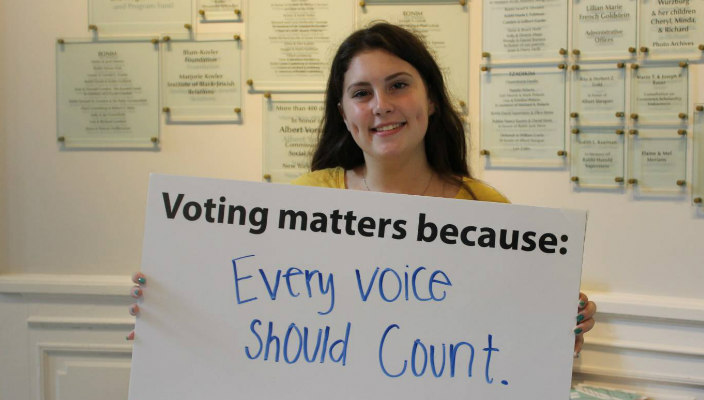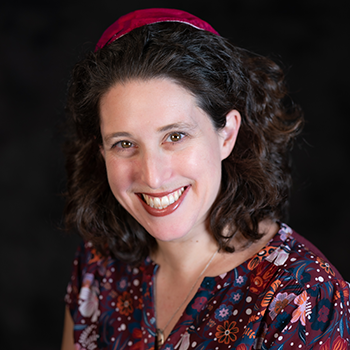
Judaism teaches us that voting is not just a civic duty. In fact, throughout Jewish history, many of our rabbis and sages have framed voting as a .
Our tradition views us as working in partnership with God to create a better world – as we pray in the Aleinu prayer, "l’takein olam b’malchut Shaddai" – and Torah calls on us to pursue justice, to care for the stranger, the widow, and the orphan, and to sustain our world.
We are further taught to “choose life, so that you and your children may live” (Deuteronomy 30:19). Choosing life is a positive action, reminding us that we have to make choices to create the world we want to live in. In a democratic society, voting is one example of making such a choice.
Rabbi Yitzhak taught, "A ruler is not to be appointed unless the community is first consulted" (Babylonian Talmud, Berachot 55a). Rabbi Yitzhak further explained that in the Torah, Bezalel could be chosen to build the Tabernacle only with the community's approval. This deeply embedded ethic of political participation has guided Jews to enthusiastically participate in the democratic process over the ages.
What Judaism Says About Voting
The Torah is clear that the requirement for civic engagement applies not just to Jewish communities, but to society at large.
As the prophet Jeremiah wrote during the exile in Babylon, we are to engage deeply in the communities where we find ourselves, building houses, putting down roots, and “seek[ing] the welfare of the city to which I have exiled you and pray to God in its behalf; for in its prosperity, you shall prosper” (Jeremiah 29: 4-7).
The Mishnah and the Talmud take this even further. In Pirkei Avot 2:4, Rabbi Hillel admonishes, “do not separate yourself from the community.” In other words, we are to be engaged. Elsewhere in Pirkei Avot, we are told, “Rabbi Hanina, the vice-high priest said: pray for the welfare (shloma) of the government (malchut), for were it not for the fear it inspires, every man would swallow his neighbor alive” (3:2).
Rabbeinu Yonah, a Spanish rabbi, Talmudist, and ethicist in the 13th century, explained this passage to emphasize the importance of Jews praying for the welfare of all people:
“Man would swallow his fellow alive: This matter is wanting to say that a person should pray for the peace of the whole world and be in pain about the pain of others. […] As a person should not make his supplications and his requests for his needs alone, but rather to pray for all people, that they be at peace. As with the welfare of the government, there is peace in the world.”
The 18th-century biblical commentator known as the Metzudat David added that “praying for peace for the [political] leadership is good, because it will then bring peace [back] to you.”
In the Talmud, we see clear support for engagement in representative politics: “Rabbi Yitzḥak said: One may only appoint a leader over a community if he consults with the community and they agree to the appointment” (Berachot 55a). The proof text given for this statement is from Exodus; the Talmud passage continues by interpreting the passage in a midrash where God seeks the people’s opinion to confirm the leadership of the person who will design the (Bezalel).
Modern-Day Jewish Commentary about Voting
More recently, Rabbi David Russo shared the story of a man who came before the Chazon Ish (a Russian-born Orthodox rabbi who spent his later years in Israel, 1878-1953) to explain that he didn’t have enough money to pay his taxes; therefore, he would not be allowed to vote in an upcoming election.
Hearing the man’s dilemma, the Chazon Ish responded: “You should sell your and pay the taxes… tefillin, you can borrow from another, but the right to vote you cannot get from someone else.”
Together, these biblical and rabbinic passages indicate that civic engagement through voting is a fundamental way to be involved in the welfare of our communities.
Elections have a real impact on the everyday lives of every single one of us, for the governments we elect develop policies and programs with local, national, and international implications. Indeed, the Supreme Court of Canada has observed that “civic participation is fundamentally important to the health of a free and democratic society.”
Now… Go Vote!
Different countries have different processes for registering to vote. If you live in the United States, you can register to vote, confirm your registration, or change your info via usa.gov. In Canada, while most Canadians of voting age are already registered in the National Register of Electors, you can confirm your registration or update your voter information through Elections Canada.
Want to take your involvement a step further? Use the resources below learn more about Judaism and voting and to get involved in the Religious Action Center's nonpartisan Every Voice, Every Vote campaign.
On Election Day, may we choose life and celebrate Torah through greater civic and community engagement.
Additional Resources:
- "The Commandment to Vote: Jewish Texts on Voting and Fair Elections": Rabbis Mark Hurvitz and Ed Stafman go in depth on the Jewish texts that speak to the mitzvah of voting.
- The Religious Action Center’s Civic Engagement Campaign: This nonpartisan initiative aims to encourage and empower U.S. Reform Jews to exercise their right to vote. It includes voter engagement resources and more.
- Reform Judaism and Civil Rights/Voting Rights: This page from the Religious Action Center of Reform Judaism shares voting- and election-related content for U.S. voters, including legislative updates and text of Reform Jewish organizations’ policies on election reform.
- “The Torah of Voting - Even When Election Day Falls on a Jewish Holiday”: This essay discusses the biblical imperative to vote, even when – as was the case in Canada in fall 2019 – election day overlaps with a Jewish holiday that commands us not to work.
- “A Blessing for Voting”: Rabbi Laura Novak Winer shares a short prayer for Election Day to help “treat that obligation with the reverence such an act deserves.
Talking with your kids about democracy and the election process communicates your values and helps children make sense of what they may hear on TV, at school, from friends, and around the dinner table. Download our free guide Grow a Good Citizen: Talking with Kids about Voting and Democracy.
Explore Jewish Life and Get Inspired
Subscribe for Emails
